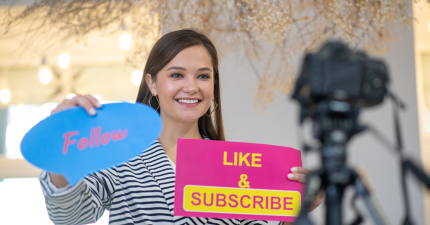
- 28 Sep, 2024
How AI is Revolutionizing Influencer-Brand Matchmaking on Digital Platforms
Introduction
With the rise of social media and digital marketing, the relationship between influencers and brands has become more crucial than ever. In the past, matching the right influencer with the right brand was a time-consuming process that often relied on manual research and guesswork. However, the advent of Artificial Intelligence (AI) has transformed this landscape, revolutionizing how influencer-brand matchmaking is conducted on digital platforms.
AI algorithms analyze vast amounts of data to identify the most suitable influencers for a brand based on various factors such as audience demographics, engagement rates, and content preferences. By leveraging AI-powered tools, brands can optimize their influencer marketing strategies and ensure that their message reaches the right audience effectively.
Moreover, AI-driven platforms enable real-time monitoring and performance tracking, allowing brands to measure the success of their influencer partnerships with precision. This level of analytics provides valuable insights into the impact of influencer collaborations, helping brands make informed decisions and refine their approach for future campaigns.
Understanding AI in Influencer Marketing
Artificial Intelligence (AI) has completely transformed the landscape of influencer marketing, particularly in the realm of influencer-brand matchmaking. By harnessing the power of AI algorithms, brands are able to identify the optimal influencers for their campaigns with unparalleled precision. These algorithms analyze a myriad of data points to match influencers whose audience demographics, engagement rates, and content align closely with the brand's goals and target audience.
One of the key advantages of AI-driven influencer marketing platforms is the ability to streamline the selection process. In the past, brands had to manually sift through a sea of potential influencers, often relying on subjective judgments and limited data. With AI, this process is not only expedited but also enhanced by data-driven insights that go beyond surface-level metrics.
By leveraging AI technology, brands can tap into the vast pool of social media data to uncover hidden patterns and correlations that may not be apparent through traditional methods. This data-driven approach not only boosts the efficiency of influencer-brand matchmaking but also enhances the overall effectiveness of influencer campaigns.
"AI is revolutionizing the way brands identify and collaborate with influencers, paving the way for more authentic and impactful partnerships." - Industry Expert
Benefits of AI in Influencer-Brand Matchmaking
As brands strive to enhance their influencer marketing strategies, the role of Artificial Intelligence (AI) cannot be understated. AI has revolutionized the process of influencer-brand matchmaking on digital platforms, offering a myriad of benefits that elevate the effectiveness and efficiency of campaigns.
One of the primary advantages of AI in influencer-brand matchmaking is its ability to analyze vast amounts of data at an incredible speed. By processing information from multiple sources, including social media trends and audience insights, AI algorithms can identify the most relevant influencers for a brand's specific campaign objectives. This data-driven approach minimizes the risk of mismatched partnerships and ensures that brands collaborate with influencers who can truly resonate with their target audience.
| Benefits of AI in Influencer-Brand Matchmaking | Details |
|---|---|
| Enhanced Targeting | AI algorithms target influencers whose followers closely align with the brand's target demographics, leading to better engagement. |
| Improved ROI | By selecting influencers based on data-driven insights, brands can optimize their ROI and maximize the impact of their influencer campaigns. |
| Real-Time Optimization | AI allows for continuous monitoring and adjustment of influencer strategies in real-time to improve performance. |
Furthermore, AI empowers brands to measure the success of their influencer partnerships with precision. Through advanced analytics and performance tracking tools, brands can assess key performance indicators (KPIs) such as engagement rates, conversion rates, and brand sentiment. This data not only provides valuable insights into the effectiveness of influencer collaborations but also informs future decision-making processes.
Another notable benefit of AI-driven influencer-brand matchmaking is the potential to foster long-term relationships with influencers. By leveraging AI to identify influencers whose values and content align with the brand's ethos, brands can establish authentic partnerships built on mutual trust and shared goals. This authenticity is key to resonating with audiences in an increasingly saturated digital landscape.
Challenges and Limitations
While Artificial Intelligence (AI) has undeniably brought about significant improvements in influencer-brand matchmaking, it is essential to acknowledge the challenges and limitations that come with this technology. One of the primary challenges is the issue of data privacy and transparency. As AI algorithms delve into vast amounts of personal data to identify suitable influencers, concerns regarding data protection and ethical use of information arise. Brands must navigate the fine line between leveraging data for targeted marketing and respecting the privacy rights of individuals.
Another critical limitation of AI in influencer-brand matchmaking is the risk of oversaturation and homogenization. As brands increasingly rely on AI algorithms to select influencers, there is a potential danger of campaigns becoming formulaic and lacking authenticity. The very uniqueness and creative aspect of influencer collaborations could be compromised if brands solely rely on data-driven decisions without considering the intricacies of individual influencers' styles and narratives.
Moreover, the dynamic nature of social media poses a challenge for AI algorithms in keeping up with rapidly evolving trends and audience preferences. While AI can analyze historical data to predict future trends to a certain extent, the ever-changing landscape of social media platforms requires human intervention and adaptability to ensure that influencer-brand partnerships remain relevant and engaging.
One significant limitation that brands may encounter is the inability of AI algorithms to fully understand nuanced cultural contexts and sensitivities. Cultural nuances play a crucial role in determining the success of influencer campaigns, and AI may struggle to grasp the intricacies of diverse cultural backgrounds, leading to potential misinterpretations or misalignments in messaging.
Future of AI in Influencer-Brand Collaborations
As Artificial Intelligence (AI) continues to evolve and shape the landscape of influencer marketing, the future holds promising advancements in influencer-brand collaborations on digital platforms. AI-driven tools are poised to revolutionize how brands discover, engage, and cultivate relationships with influencers, ushering in a new era of dynamic and data-informed partnerships.
One of the key trajectories in the future of AI in influencer-brand matchmaking is the increased personalization and customization of campaigns. AI algorithms are becoming more adept at understanding individual consumer preferences and behaviors, allowing brands to tailor their influencer strategies with precision. This hyper-personalization not only enhances audience engagement but also fosters a deeper connection between the brand, the influencer, and the target demographic.
Moreover, the integration of AI technologies like natural language processing (NLP) and sentiment analysis holds immense potential in refining influencer collaborations. By analyzing the sentiment and tone of influencer content as well as audience responses, brands can gauge the authenticity and impact of partnerships more accurately. This nuanced understanding enables brands to fine-tune their messaging strategies and optimize the resonance of influencer campaigns.
Another intriguing aspect of the future of AI in influencer-brand collaborations is the emergence of predictive analytics and machine learning models. These advanced capabilities empower brands to forecast trends, anticipate audience preferences, and preemptively adapt their influencer strategies. By leveraging predictive analytics, brands can stay ahead of the curve in the ever-evolving digital landscape and proactively shape their influencer initiatives for maximum effectiveness.
Furthermore, the convergence of AI with augmented reality (AR) and virtual reality (VR) technologies is set to redefine the immersive nature of influencer marketing. Brands can harness AI-powered insights to create hyper-realistic and interactive experiences that blur the lines between virtual influencers and real-world engagements. This fusion of AI and AR/VR not only amplifies brand storytelling but also offers consumers unprecedented levels of engagement and brand immersion.




